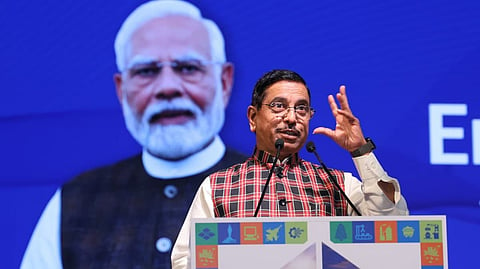

New Delhi: Union Minister for New and Renewable Energy Pralhad Joshi on Thursday warned that the world has “a maximum of seven years” before global temperatures rise by 1.5 degrees Celsius above pre-industrial levels, calling for immediate collective action to protect the planet’s biodiversity and ecological balance.
Follow Energy Watch on X
Addressing the ‘Vibrant Gujarat’ Regional Conference at Ganpat University in Mehsana, Joshi said that growing energy demand and unsustainable lifestyles were pushing the planet toward dangerous climate thresholds. “Due to our increasing demand, we are becoming unsustainable, not sustainable. We are destroying nature and biodiversity,” he said, adding that a further temperature rise could have catastrophic effects on ecosystems.
Joshi cautioned that the Earth has already warmed by about 1.1 degrees Celsius since the Industrial Revolution, leading to the extinction of several species, including polar bears and polar foxes. “We have a maximum of seven years before the temperature rises by 1.5 degrees. If we cross this, the situation will become very serious,” he said.
Linking the climate crisis to India’s clean energy progress, Joshi said the country’s solar capacity has risen from 2.8 GW in 2014 to 125 GW today, crediting what he described as Prime Minister Narendra Modi’s early vision for solar development. He recalled that when Modi initiated the solar programme 25 years ago, solar power cost Rs 18–20 per unit. “A visionary is someone who can foresee what will happen 20–25 years later. The Prime Minister had envisioned it at that time. Today, this vision has become a revolution,” he said.
Joshi added that recent bids have seen solar tariffs fall as low as Rs 2.15 per unit in Madhya Pradesh, and even with battery storage, the cost remains at Rs 2.70 per unit — a sign of how clean energy has become the most competitive source of power in India.
Praising Gujarat’s leadership in renewable energy, Joshi said the state now sources about 60 percent of its installed power capacity from renewable sources. He described Mehsana as a “dynamic place” for clean energy innovation and lauded Modhera — the first village in India to be powered entirely by solar energy — as a symbol of what sustainable communities can achieve.
Follow Energy Watch on LinkedIN
The minister urged youth and industrialists to join the renewable transition and act decisively to protect the planet. “This is the time. We must protect the Earth. We must protect biodiversity,” he said, appealing for greater adoption of solar and clean energy technologies.
